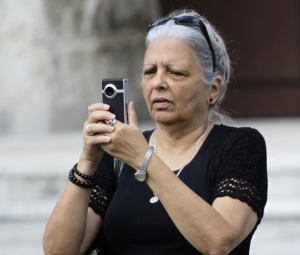
HAVANA, CUBA — This last Wednesday, I was walking quickly through Belascoain, disgusted by the odor of urine from the doorways. Every once in a while a peddler called his wares. On arriving at Zanja, crossing the street, the area was deserted. Three men in plainclothes blocked the door of building 409, where Marta Beatriz Roque Cabello lives.
I tried to ignore them and continued. The door was locked.
“Where are you going?”
“Who’s asking?”
The man, with an eastern accent, responded while putting in front of my eyes an identity card with initials in red: DSE.
“State Security Department, my dear,” he said with that lack of professionalism that one cannot imagine.
He did not clarify what it was all about. He again asked me the first question, and I told him that I was going to see Marta Beatriz Roque.
He took my identification and led me inside the building. He called one of his minions, a black man about two meters tall and more than 50 years of age, whom he called “brigade-ist.” And he told him, “Keep her here, she cannot go up to see Martha Beatriz.”
A thermos of coffee on one of the steps of the wide staircase betrayed the complicity of some neighbors with the political police. Two uniformed policewomen appeared on the scene. The “brigade-ist” charged one of them with watching me.
 I tried to find out what had happened to the boys of the Communicators Network, which was supposed to meet like every Wednesday in the home of Marta Beatriz, director of the group. The answer could be assumed, but getting a statement from the authorities is always the most difficult. I did not get one.
I tried to find out what had happened to the boys of the Communicators Network, which was supposed to meet like every Wednesday in the home of Marta Beatriz, director of the group. The answer could be assumed, but getting a statement from the authorities is always the most difficult. I did not get one.
Beginning last November 19 there has been a police blockade around Roque Cabello and the group of community reporters who from their locations in 9 provinces report on events that affects the lives of common Cubans: collapses, evictions, disasters in medical care, and social security. All these testimonies absent from the massive official medial, monopolized by the State.
In all, the members of the Network come to 127. They have a common denominator: They are not afraid; at least this situation has not managed to paralyze them. They have managed to get people to tell their stories with their complete names and photographs! Sometimes even their personal address.
They have a bulletin entitled Hairnet which is published every fifteen days. Hairnet is printed and distributed clandestinely within Cuba.
Other digital sites like Cubanet, MartiNoticias, Diario de Cuba, Miscelaneas de Cuba and Primavera Digital publish their accounts. They have served other independent reporters by identifying items of interest.
Precisely, I had gone there in order to write about the boycott, the physical attacks, acts of repudiation, arbitrary detentions of them; perpetrated by the political policy with the collaboration of some neighbors of the building. The only thing that I could do was try to obtain more information.
I again asked the uniformed policewoman about the members of the Network.
“Are they detained?”
“I do not know. I cannot explain it to you.”
“Can I make a telephone call?”
“No.”
I asked her if she had no doubts that what she was doing was correct.
“You’re going to convince me that what Marta Beatriz is doing is fine?” she asked me.
It seemed to me that she doubted.
“What do you think that Marta Beatriz does? It’s not going to be the bad thing they have told you,” I said at my own risk.
I got no answer. I went on to explain to her that citizen journalism is a right protected by the Universal Declaration of Human Rights, and that if she was not familiar with the document, I told her that in the civilized world anyone can express his opinions, even against official policy and not be bothered for it. Much less by the police, charged with protecting the tranquility and freedom of citizens.
She ordered me to shut up. A commotion ensued that made the second woman police officer come down the stairs. Until this moment, she had been on the landing obviously in order to impede Marta Beatriz from leaving her home. The two policewomen and I were arguing with raised voices when we saw Marta Beatriz taking photos on the stair landing. One of the women ran after her, jumping the stairs. She shrieked, “Stupid, get in the house and don’t even stick your head out!”
They opened the door each time some neighbor entered or left. The terrifying thing was seeing how the tenants greeted the police or simply moved along.
That made me think that, indeed, we would not have to wait to become a majority in order to obtain constitutional recognition.

After about 30 minutes, they took me to a patrol car. On arriving at the traffic light of Calzada del Cerro and Rancho Boyeros, they handed me my identity card and I understood that I could go home, when the same policewoman who argued with me said with gritted teeth:
“Freed today.”
On arriving home I called Marta Beatriz. She told me that that day they had detained 16 people at the door of her home; 15 journalists plus a server. But those were freed in places as distant as the “La Monumental” highway or the municipality of Caimito in the former Havana province (today Mayabeque). They left me, I do not know why, at the corner of my house.
January 24, 2014 | Lilianne Ruíz
Translated by mlk.
